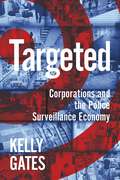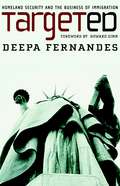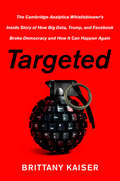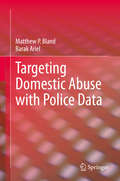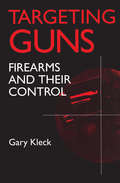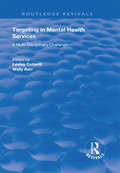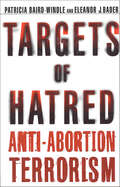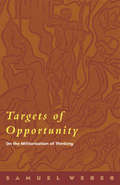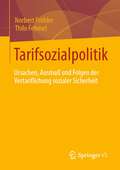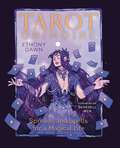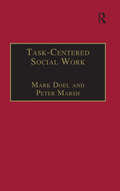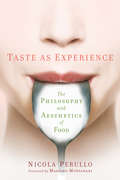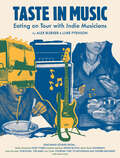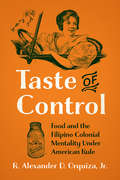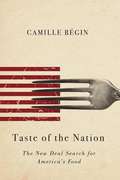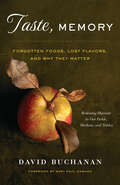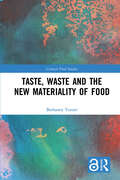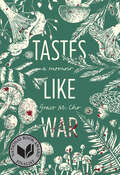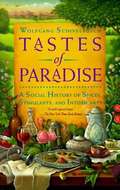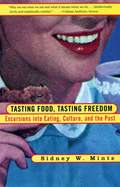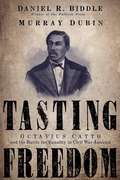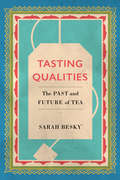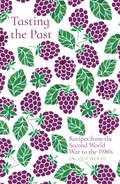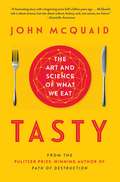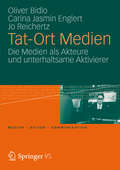- Table View
- List View
Targeted: Corporations and the Police Surveillance Economy (Critical Cultural Communication)
by Kelly GatesHow video transformed policing and securityVideo cameras are everywhere: attached to buildings, drones, and dashboards; embedded in smartphones, laptops, and doorbells; worn on police uniforms and sunglasses. In Targeted, Kelly Gates argues that the resulting avalanche of video has transformed the landscape of policing and security in the twenty-first century. Video production, analysis, and archival management are now central to the ways police power is exercised, criminal law enforced, and spaces of human habitation securitized.Gates examines the primacy of video in four key areas of policing and security: the field of digital multimedia forensics, private video surveillance infrastructure development, police body-worn camera systems, and video analytics for automated surveillance (Video AI). Case studies of two companies illustrate the role of corporations in these far-reaching media-technological changes. Target Corporation has integrated its retail security operations with law enforcement, expanding its surveillance beyond its stores and parking lots and into the criminal legal system. Axon Enterprise is leveraging the growing volume of police body-cam video to build a large-scale proprietary platform for policing.Targeted reveals the role of video infrastructure development in the increasingly entangled relationship between the modern police and the modern corporation, in the long wake and ruins of neoliberalism.
Targeted: Homeland Security and the Business of Immigration
by Deepa FernandesAmerica has always portrayed itself as a country of immigrants, welcoming each year the millions seeking a new home or refuge in this land of plenty. Increasingly, instead of finding their dream, many encounter a nightmare--a country whose culture and legal system aggressively target and prosecute them. In Targeted, journalist Deepa Fernandes seamlessly weaves together history, political analysis, and first-person narratives of those caught in the grips of the increasingly Kafkaesque U.S. Homeland Security system. She documents how in post-9/11 America immigrants have come to be deemed a national security threat. Fernandes--herself an immigrant well-acquainted with U.S. immigration procedures--takes the reader on a harrowing journey inside the new American immigrant experience, a journey marked by militarized border zones, racist profiling, criminalization, detention and deportation. She argues that since 9/11, the Bush administration has been carrying out a series of systematic changes to decades-old immigration policy that constitute a roll back of immigrant rights and a boon for businesses who are helping to enforce the crackdown on immigrants, creating a growing "Immigration Industrial Complex." She also documents the bullet-to-ballot strategy of white supremacist elements that influence our new immigration legislation.
Targeted: The Cambridge Analytica Whistleblower's Inside Story of How Big Data, Trump, and Facebook Broke Democracy and How It Can Happen Again
by Brittany KaiserAn “important and gripping” memoir by the woman who blew the whistle on Cambridge Analytica and the data industry’s unethical practices (The Washington Post).When Brittany Kaiser joined Cambridge Analytica—the UK-based political consulting firm funded by conservative billionaire and Donald Trump patron Robert Mercer—she was an idealistic young professional, a veteran of Barack Obama’s 2008 campaign with degrees in human rights law and international relations. Her goal was to utilize data for humanitarian purposes, most notably to prevent genocide and human rights abuses. But her experience inside Cambridge Analytica opened her eyes to the tremendous risks this unregulated industry poses to privacy and democracy. In this explosive memoir, she reveals the disturbing truth about the multi-billion-dollar data industry, revealing how companies are getting richer using our personal information and exposing how Cambridge Analytica exploited weaknesses in privacy laws to help elect Donald Trump in 2016.Targeted is Kaiser’s eyewitness chronicle of the dramatic and disturbing story of the rise and fall of Cambridge Analytica. She reveals how Facebook’s lax policies and lack of sufficient national laws allowed voters to be manipulated in both Britain and the US, where personal data was weaponized to spread fake news and racist messaging during the Brexit vote and the 2016 election. In the aftermath, as she became aware of the horrifying reality of what Cambridge Analytica had done, Kaiser made the difficult choice to expose the truth. Risking her career, relationships, and personal safety, she told authorities about the industry’s unethical practices, eventually testifying before Parliament about the company’s Brexit efforts and helping Special Counsel Robert Mueller’s investigation into Russian interference in the 2016 election, alongside at least ten other international investigations.Packed with never-before-publicly-told stories, Targeted goes inside the secretive meetings with Trump campaign personnel—and makes the case that legal oversight of the data industry is not only justifiable but essential to ensuring the long-term safety of our democracy.“Captivating and revelatory.” —Publishers Weekly (starred review)Includes photographs
Targeting Domestic Abuse with Police Data
by Barak Ariel Matthew P. BlandThis book explores the potential of domestic abuse data to assess the level of harm caused to victims and the amount of resources required to respond to it. Policing domestic abuse has become a major activity for the police service in England and Wales. Part of the police strategy is to gather hundreds of thousands of detailed records about victims and suspects – the single largest set of domestic abuse records available, but one that to date has largely unexplored by researchers. In this volume, Matthew Bland and Barak Ariel analyse three substantial datasets taken from police forces across the country and ask:· Can police data be used to derive meaningful insight?· How should we use these data to measure harm?· Just how much domestic abuse involves a repeat victim?· Does abuse get more serious over time?· Can serious domestic abuse be predicted before it occurs? This volume illustrates the scale of the challenge the police and other agencies face with reducing domestic abuse. A small proportion of individuals generate a majority of harm; this book argues that police records offer opportunities to identify these individuals before the harm occurs. Demonstrating that statistical techniques can be used to profile domestic abuse to target harm reduction strategies more precisely and even identify a sizable proportion of serious cases before they occur, this volume will be of interest to law enforcement officials, policing researchers, and policy makers interested in reducing the phenomenon of domestic abuse.
Targeting Guns: Firearms and Their Control (Social Institutions And Social Change Ser.)
by Gary KleckThis new paperback comprehensively reviews the research evidence on the links between guns, violence, and gun control, and reports results of the author's own research as well. In Targeting Guns, Kleck follows the line of argument and careful statistical inference of his earlier prizewinning volume, Point Blank, while updating the literature reviews and statistical information, and adding two chapters.
Targeting in Mental Health Services: A Multi-disciplinary Challenge
by Lesley Cotterill Wally BarrThis title was first published in 2000: This work has its origins in a three-year research project initially entitled, "Do SEMI Registers Make a Difference?" and known, for short, as the SEMI Register Project. The research project was designed to monitor and evaluate the introduction of registers for people with severe and enduring mental illness (SEMI) in general practices across the Wirral. In the context of this discussion, and within the framework of the mental health and social care reforms currently being introduced, key issues in the targeting agenda include: definitional issues surrounding the term "SEMI"; practical and methodological concerns about how people with SEMI are to be identified and targeted; interface issues relating to multi-disciplinary working between primary and secondary care; issues concerning the evidence-base for risk management policies and strategies; the role of training in effective targeting; reflection on the potential consequences of targeting policies and initiatives; and the meaningful involvement of service users from all sections of society.
Targets of Hatred: Anti-Abortion Terrorism
by Patricia Baird-Windle Eleanor J. BaderTargets of Hatred charts the development of the anti-abortion movement in North America. Beginning in the years preceding the 1973 Roe vs. Wade decision that legalized abortion, the book examines the roles played by the Catholic Church, Fundamentalist Protestants, and Republican and Democratic parties, and assesses points of overlap and divergence. The voices of more than 190 providers in the United States and Canada--clinic owners, doctors, nurses, technicians, and their families--give readers an in-depth look at what it means to work in a field in which arson, bombings, harassment, and killing are routine. Filled with dramatic, eye-witness accounts of anti-abortion terrorism, the book demonstrates law enforcement's failure to stem the violence and is a call to arms for concerned individuals.
Targets of Opportunity: On the Militarization of Thinking
by Samuel WeberThe title of this book echoes a phrase used by the Washington Post to describethe American attempt to kill Saddam Hussein at the start of the war againstIraq. Its theme is the notion of targeting (skopos) as the name of an intentionalstructure in which the subject tries to confirm its invulnerability by aiming todestroy a target. At the center of the first chapter is Odysseus’s killing of the suitors;the second concerns Carl Schmitt’s Roman Catholicism and Political Form; thethird and fourth treat Freud’s “Thoughts for the Times on War and Death” and“The Man Moses and Monotheistic Religion.” Weber then traces the emergenceof an alternative to targeting, first within military and strategic thinking itself(“Network Centered Warfare”), and then in Walter Benjamin’s readings of“Capitalism as Religion” and “Two Poems of Friedrich Hölderlin.”
Tarifsozialpolitik: Ursachen, Ausmaß und Folgen der Vertariflichung sozialer Sicherheit
by Thilo Fehmel Norbert FröhlerDie anhaltende Transformation des Sozialstaats ist mit einer Bedeutungszunahme tarifvertraglicher Regulierung von sozialer Sicherung verbunden. Der Band bietet erstmals einen umfassenden Überblick über den Stand und die Entwicklung tariflicher Sozialpolitik. Als Bestandsaufnahme enthält er umfangreiche und die zeitliche Entwicklung nachzeichnende Darstellungen für die Alterssicherungs-, Arbeitsmarkt-, Gesundheits- und Familienpolitik in verschiedenen Branchen. Die Untersuchung fragt zudem nach den grundsätzlichen Wahrnehmungen, Einschätzungen und Bewertungen der Tarifvertragsparteien hinsichtlich der Verlagerung sozialpolitischer Verantwortung auf das System der industriellen Beziehungen. Neben Branchen und sozialpolitischen Feldern vergleicht die Studie auch Institutionensysteme. Obwohl mit Deutschland und Österreich zwei institutionell sehr ähnliche Distributionsregimes gegenübergestellt werden, finden sich erhebliche Unterschiede zwischen den beiden Ländern sowohl in Hinblick auf den Vertariflichungsgrad als auch auf die Sichtweisen von Arbeitgeberverbänden und Gewerkschaften. Im Ergebnis zeigt sich: Die Möglichkeiten der Tarifpolitik, eine den Interessen der Beschäftigten angemessene soziale Sicherung zu organisieren, hängen ab von den Rahmungen des Gesetzgebers: Auch bei zunehmend vertariflichter sozialer Sicherheit bleibt der Sozialstaat in sozialpolitischer Verantwortung.
Tarot Grimoire: Spreads and Spells for a Magical Life
by Ethony DawnTarot Spreads and Spells that Raise Your Magic to the Next LevelUnabashedly embracing the magic and mystery of tarot, this book invites you on a self-empowering journey to reveal and grow your inner mystic. Tarot expert Ethony Dawn channels her profound divinatory and magical knowledge into this book's unique spreads and spells that bring positive change into your life well after the reading session is done.Tarot Grimoire introduces you to the cards' symbols and meanings alongside a complete course in spellcasting with step-by-step instructions. For each of the seventy-eight cards, Ethony has designed an original spread and a customizable spell that teach readers to manifest the energies embodied by the arcana.Begin your journey with the Fool's Have Faith Charm. Delve deeper into the major arcana with the Chariot's Torn Between Two Decisions Spread. Develop a relationship with the minor arcana using spreads like the Three of Wands' Long-Term Goal Spread. Improve your connection to the court cards with the Queen of Pentacles' Heal My Body Spell. This hands-on book is a metaphysical blueprint for deepening your work with the tarot.Foreword by Benebell Wen, author of Holistic Tarot
Task-Centred Social Work (The\social Work Skills Ser.)
by Mark Doel Peter MarshTask-centred practice is a forward thinking, goal-orientated approach to social work. It is a practice-based approach built on research which reflects the new mood being developed in the social work field, and it has now been successfully used in a wide variety of settings and circumstances. The theme of Task-Centred Social Work is partnership; exploring the principles on which task-centred practice is based, while offering clear and practical guidance for work, whether with people who seek help with social problems, or with those who are ’involuntary clients’. The book describes in detail the sequence of work to help clients move from present problems to future goals. This is illustrated by a case study which runs through the chapters and uses an imaginative recording style. Checklists and bibliographies are also used to aid understanding. The authors respond to the model's critics and explore both the scope and the limitations of the task-centred practice. Social professionals, whether working in practice or in training settings will find this book an invaluable aid to the development of successful social practice work.
Taste as Experience: The Philosophy and Aesthetics of Food (Arts and Traditions of the Table: Perspectives on Culinary History)
by Nicola PerulloTaste as Experience puts the pleasure of food at the center of human experience. It shows how the sense of taste informs our preferences for and relationship to nature, pushes us toward ethical practices of consumption, and impresses upon us the importance of aesthetics. Eating is often dismissed as a necessary aspect of survival, and our personal enjoyment of food is considered a quirk. Nicola Perullo sees food as the only portion of the world we take in on a daily basis, constituting our first and most significant encounter with the earth. Perullo has long observed people's food practices and has listened to their food experiences. He draws on years of research to explain the complex meanings behind our food choices and the thinking that accompanies our gustatory actions. He also considers our indifference toward food as a force influencing us as much as engagement. For Perullo, taste is value and wisdom. It cannot be reduced to mere chemical or cultural factors but embodies the quality and quantity of our earthly experience.
Taste in Music: Eating on Tour with Indie Musicians
by Luke Pyenson Alex BleekerA Pitchfork Best Book of 2024A Saveur Best Narrative Food Book of 2024In this unique and deeply thoughtful collection, musician Alex Bleeker (Real Estate) and food and travel journalist Luke Pyenson (formerly of Frankie Cosmos) take readers on tour with a diverse lineup of inspiring indie musicians from around the world, sharing meals and travel experiences, peeking behind the curtain at this singular and singularly misunderstood way of life.Through original essays and engaging conversations with dozens of indie musicians representing several subgenres, scenes, and eras, food takes center stage in stories about being on tour and eating on tour and how this basic human necessity can create a sense of community and interconnectedness in one of the most mobile industries in the world. Based broadly on the subject of eating on tour, these entries each spin off into their own focused and exciting behind-the-scenes story, but all confirm what Pyenson and Bleeker suspected all along—food looms large in the lives of touring musicians, and it can be used as a gateway into understanding what going on tour is really like.Featured contributors include:Robin Pecknold (Fleet Foxes) Chris Frantz (Talking Heads) Natalie Mering (Weyes Blood) Mark Ibold (Pavement)John Gourley (Portugal. The Man)Lily Chait (touring chef to boygenius and Phoebe Bridgers) Amelia Meath (Sylvan Esso)Greta Kline (Frankie Cosmos) Devendra BanhartBob Mould (Hüsker Dü) Brian "Geologist" Weitz (Animal Collective)Dawn RichardSasami Ashworth (SASAMI)Sadie Dupuis (Speedy Ortiz)The BethsIn addition to wide-angle meditations about eating on tour, Pyenson and Bleeker have gathered stories that take place on five continents, in private homes and street-side stalls, in temples of fine dining and in actual temples, backstage and in the van, early morning and late at night. Stories that deal with the best parts of touring: meaningful cultural exchange, hospitality-induced euphoria, and the opportunity to build relationships around the world. And the worst: loneliness, exhaustion, estrangement from family and friends, struggles with disordered eating, and unsteady access to medical care.So the question isn’t, “How was tour?” It’s, “What do you eat on tour?” Like the best songs or meals, these conversations and essays evoke something central about the human experience. They show us all the ways that music and food bring us together, break us down, lift us up, and add color to our lives.NOTABLE AUTHORS: With over twenty years of experience in the music industry, Alex Bleeker and Luke Pyenson are your perfect guides into the world of touring. Having toured with their own bands—Real Estate and Frankie Cosmos, respectively—they're asking all the right questions, shedding light and understanding on the lives of touring musicians and the people feeding them.FOOD ANTHOLOGY & MUSIC SCENE DEEP CUT: With interviews and essays from about forty different musicians, chefs, and promoters—ranging from Chris Frantz from Talking Heads to boygenius’s private chef Lily Chait—not only is this book a treasure trove of knowledge and insider information, it also offers something for foodies and music enthusiasts alike.ARMCHAIR TRAVEL: Go behind the curtain all around the world, from America to Russia, Japan to Italy, and dozens of places in between. Read about your favorite musicians’ experiences abroad, all from the comfort of your home. Perfect for:Musicians and fans of indie musicFoodies, chefs, restaurant owners, and home cooksAnyone interested in the music businessTravel enthusiasts Readers who enjoyed <em
Taste of Control: Food and the Filipino Colonial Mentality Under American Rule
by René Alexander OrquizaFilipino cuisine is a delicious fusion of foreign influences, adopted and transformed into its own unique flavor. But to the Americans who came to colonize the islands in the 1890s, it was considered inferior and lacking in nutrition. Changing the food of the Philippines was part of a war on culture led by Americans as they attempted to shape the islands into a reflection of their home country. Taste of Control tells what happened when American colonizers began to influence what Filipinos ate, how they cooked, and how they perceived their national cuisine. Food historian René Alexander D. Orquiza, Jr. turns to a variety of rare archival sources to track these changing attitudes, including the letters written by American soldiers, the cosmopolitan menus prepared by Manila restaurants, and the textbooks used in local home economics classes. He also uncovers pockets of resistance to the colonial project, as Filipino cookbooks provided a defense of the nation’s traditional cuisine and culture. Through the topic of food, Taste of Control explores how, despite lasting less than fifty years, the American colonial occupation of the Philippines left psychological scars that have not yet completely healed, leading many Filipinos to believe that their traditional cooking practices, crops, and tastes were inferior. We are what we eat, and this book reveals how food culture served as a battleground over Filipino identity.
Taste of the Nation: The New Deal Search for America's Food
by Camille BeginDuring the Depression, the Federal Writers' Project (FWP) dispatched scribes to sample the fare at group eating events like church dinners, political barbecues, and clambakes. Its America Eats project sought nothing less than to sample, and report upon, the tremendous range of foods eaten across the United States. Camille Begin shapes a cultural and sensory history of New Deal-era eating from the FWP archives. From "ravioli, the diminutive derbies of pastries, the crowns stuffed with a well-seasoned paste" to barbeque seasoning that integrated "salt, black pepper, dried red chili powder, garlic, oregano, cumin seed, and cayenne pepper" while "tomatoes, green chili peppers, onions, and olive oil made up the sauce", Begin describes in mouth-watering detail how Americans tasted their food. They did so in ways that varied, and varied widely, depending on race, ethnicity, class, and region. Begin explores how likes and dislikes, cravings and disgust operated within local sensory economies that she culls from the FWP's vivid descriptions, visual cues, culinary expectations, recipes and accounts of restaurant meals. She illustrates how nostalgia, prescriptive gender ideals, and racial stereotypes shaped how the FWP was able to frame regional food cultures as "American."
Taste, Memory: Forgotten Foods, Lost Flavors, and Why They Matter
by David BuchananTaste, Memory traces the experiences of modern-day explorers who rediscover culturally rich forgotten foods and return them to our tables for all to experience and savor.In Taste, Memory author David Buchanan explores questions fundamental to the future of food and farming. How can we strike a balance between preserving the past, maintaining valuable agricultural and culinary traditions, and looking ahead to breed new plants? What place does a cantankerous old pear or too-delicate strawberry deserve in our gardens, farms, and markets? To what extent should growers value efficiency and uniformity over matters of taste, ecology, or regional identity?While living in Washington State in the early nineties, Buchanan learned about the heritage food movement and began growing fruit trees, grains, and vegetables. After moving home to New England, however, he left behind his plant collection and for several years stopped gardening. In 2005, inspired by the revival of interest in regional food and culinary traditions, Buchanan borrowed a few rows of growing space at a farm near his home in Portland, Maine, where he resumed collecting. By 2012 he had expanded to two acres, started a nursery and small business, and discovered creative ways to preserve rare foods. In Taste, Memory Buchanan shares stories of slightly obsessive urban gardeners, preservationists, environmentalists, farmers, and passionate cooks, and weaves anecdotes of his personal journey with profiles of leaders in the movement to defend agricultural biodiversity.Taste, Memory begins and ends with a simple premise: that a healthy food system depends on matching diverse plants and animals to the demands of land and climate. In this sense of place lies the true meaning of local food.
Taste, Waste and the New Materiality of Food (Critical Food Studies)
by Bethaney TurnerAnthropocentric thinking produces fractured ecological perspectives that can perpetuate destructive, wasteful behaviours. Learning to recognise the entangled nature of our everyday relationships with food can encourage ethical ecological thinking and lay the foundations for more sustainable lifestyles. This book analyses ethnographic data gathered from participants in Alternative Food Networks from farmers’ markets to community gardens, agricultural shows and food redistribution services. Drawing on theoretical insights from political ecology, eco-feminism, ecological humanities, human geography and critical food studies, the author demonstrates the sticky and enduring nature of anthropocentric discourses. Chapters in this book experiment with alternative grammars to support and amplify ecologically attuned practices of human and more-than-human togetherness. In times of increasing climate variability, this book calls for alternative ontologies and world-making practices centred on food which encourage agility and adaptability and are shown to be enacted through playful tinkering guided by an ethic of convivial dignity. This innovative book offers a valuable insight into food networks and sustainability which will be useful core reading for courses focusing on critical food studies, food ecology and environmental studies.
Tastes Like War: A Memoir
by Grace M. ChoGrace M. Cho grew up as the daughter of a white American merchant marine and the Korean bar hostess he met abroad. They were one of few immigrants in a xenophobic small town during the Cold War, where identity was politicized by everyday details—language, cultural references, memories, and food. When Grace was fifteen, her dynamic mother experienced the onset of schizophrenia, a condition that would continue and evolve for the rest of her life. <P><P> Part food memoir, part sociological investigation, Tastes Like War is a hybrid text about a daughter’s search through intimate and global history for the roots of her mother’s schizophrenia. In her mother’s final years, Grace learned to cook dishes from her parent’s childhood in order to invite the past into the present, and to hold space for her mother’s multiple voices at the table. And through careful listening over these shared meals, Grace discovered not only the things that broke the brilliant, complicated woman who raised her—but also the things that kept her alive.
Tastes of Paradise: A Social History of Spices, Stimulants, and Intoxicants
by Wolfgang SchivelbuschFrom the extravagant use of pepper in the Middle Ages to the Protestant bourgeoisie's love of coffee to the reason why fashionable Europeans stopped sniffing tobacco and starting smoking it, Schivelbusch looks at how the appetite for pleasure transformed the social structure of the Old World. Illustrations.
Tasting Food, Tasting Freedom: Excursions Into Eating, Power, and the Past
by Sidney W. MintzA renowned anthropologist explores the history and meaning of eating in America. Addressing issues ranging from the global phenomenon of Coca-Cola to the diets of American slaves, Sidney Mintz shows how our choices about food are shaped by a vast and increasingly complex global economy. He demonstrates that our food choices have enormous and often surprising significance.
Tasting Freedom: Octavius Catto and the Battle for Equality in Civil War America
by Murray Biddle Daniel R. DubinOctavius Valentine Catto was an orator who shared stages with Frederick Douglass, a second baseman on Philadelphia’s best black baseball team, a teacher at the city’s finest black school and an activist who fought in the state capital and on the streets for equal rights. With his racially-charged murder, the nation lost a civil rights pioneer—one who risked his life a century before Selma and Birmingham. In Tasting FreedomMurray Dubin and Pulitzer Prize winner Dan Biddle painstakingly chronicle the life of this charismatic black leader—a “free” black whose freedom was in name only. Born in the American south, where slavery permeated everyday life, he moved north where he joined the fight to be truly free—free to vote, go to school, ride on streetcars, play baseball and even participate in July 4th celebrations. Catto electrified a biracial audience in 1864 when he proclaimed, “There must come a change,” calling on free men and women to act and educate the newly freed slaves. With a group of other African Americans who called themselves a “band of brothers,” they challenged one injustice after another. Tasting Freedompresents the little-known stories of Catto and the men and women who struggled to change America.
Tasting Qualities: The Past and Future of Tea (Atelier: Ethnographic Inquiry in the Twenty-First Century #5)
by Sarah BeskyWhat is the role of quality in contemporary capitalism? How is a product as ordinary as a bag of tea judged for its quality? In her innovative study, Sarah Besky addresses these questions by going inside an Indian auction house where experts taste and appraise mass-market black tea, one of the world’s most recognized commodities. Pairing rich historical data with ethnographic research among agronomists, professional tea tasters and traders, and tea plantation workers, Besky shows how the meaning of quality has been subjected to nearly constant experimentation and debate throughout the history of the tea industry. Working across fields of political economy, science and technology studies, and sensory ethnography, Tasting Qualities argues for an approach to quality that sees it not as a final destination for economic, imperial, or post-imperial projects but as an opening for those projects.
Tasting the Past: Recipes from the Second World War to the 1980s (Tasting the Past)
by Jacqui WoodThe many influences of the past on our diet today make the concept of ‘British food’ very hard to define. The Celts, Romans, Saxons, Vikings and Normans all brought ingredients to the table, and the country was introduced to all manner of spices after the Crusades. The Georgians enjoyed a new level of excess and then, of course, the world wars forced us into the challenge of making meals from very little. The history of cooking in Britain is as tumultuous as the times its people have lived through. Tasting the Past: Recipes from the Second World War to the 1980s documents the rich history of our food, its fads and its fashions to be combined with a practical cookbook of over 120 recipes from the Second World War onwards. Jacqui Wood guides us through the nutritious and pragmatic recipes of wartime Britain, which juggled rationing and shortages to produce delicious food and keep morale high; through the era of convenience food and television chefs in the 1960s; and finally the yuppies and stacked food of the 1980s.
Tasty
by John McquaidA fascinating and deeply researched investigation into the mysteries of flavor--from the first bite taken by our ancestors to scientific advances in taste and the current "foodie" revolution.Taste has long been considered the most basic of the five senses because its principal mission is a simple one: to discern food from everything else. Yet it's really the most complex and subtle. Taste is a whole-body experience, and breakthroughs in genetics and microbiology are casting light not just on the experience of french fries and foie gras, but the mysterious interplay of body and brain. With reporting from kitchens, supermarkets, farms, restaurants, huge food corporations, and science labs, Tasty tells the story of the still-emerging concept of flavor and how our sense of taste will evolve in the coming decades. Tasty explains the scientific research taking place on multiple fronts: how genes shape our tastes; how hidden taste perceptions weave their way into every organ and system in the body; how the mind assembles flavors from the five senses and signals from body's metabolic systems; the quest to understand why sweetness tastes good and its dangerous addictive properties; why something disgusts one person and delights another; and what today's obsessions with extreme tastes tell us about the brain. Brilliantly synthesizing science, ancient myth, philosophy, and literature, Tasty offers a delicious smorgasbord of where taste originated and where it's going--and why it changes by the day.
Tat-Ort Medien
by Oliver Bidlo Carina Jasmin Englert Jo ReichertzDer Alltag menschlichen Zusammenlebens in modernen (nicht nur) westlichen Gesellschaften ist durch eine tiefgreifende und umfassende Mediatisierung gekennzeichnet: Medien spielen bei der kommunikativen Konstruktion von Wirklichkeit eine immer gewichtigere Rolle - vor allem dadurch, dass sie neben den Kommunikationsinhalten auch die Kommunikationsformen und das kommunikative und gesellschaftliche Handeln maßgeblich beeinflussen. Medien werden auch im Bereich der Inneren Sicherheit zunehmend eigenständige Akteure, die auf die Sicherheit ihrer Kunden achten und in deren Interesse selbst aktiv werden. Medien werden darüber hinaus auch Aktivierer, die ihre Kunden unterhaltsam dazu anhalten, sich regelkonform selbst zu führen oder aber sich in Maßen an der ,Arbeit' der Medien selbst zu beteiligen. Wir sind Zeitzeugen einer tief greifenden Mediatisierung der Sicherheitspolitik.
